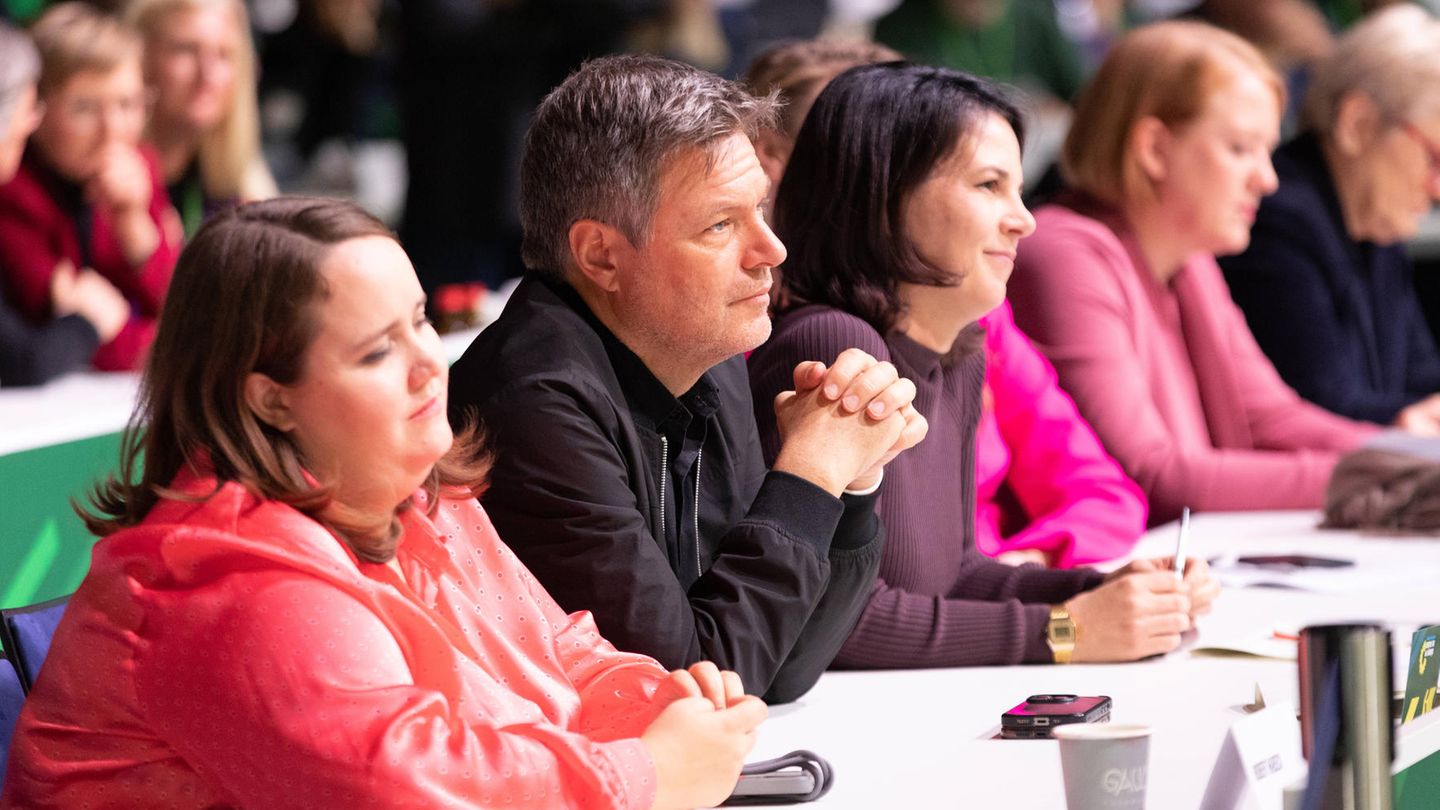Late at the party conference in Karlsruhe, the Greens debated heatedly about the right course for asylum policy. Things are looking tight for the party leadership at the moment – they now want the mood to be seen as a mandate.
How serious the situation is and how divided the Greens are on the question of the right asylum policy can be seen in the vote on a headline late on Saturday evening. “Humanity and order” is what the Federal Executive Board wants the chapter to be asylum and migration for the European election program.
That sounds too conservative, too much like that CDU, many of the Greens think. They want it to say “Humanity and Human Rights” instead. One could consider it to be a subtle quibble. But that would be too short-sighted.
“Humanity and order” is not just a headline, the two words describe the course that the party leadership is taking in the migration debate. This is what the co-chairwoman has Ricarda Lang spelled out in a joint guest article with the Prime Minister of Baden-Württemberg, Winfried Kretschmann. It says, among other things: “Control and repatriation” are part of the reality of an immigration country like Germany. “When capacities reach their limits – as they are now – the numbers must also fall,” it also says. This announcement scares some party leftists.
At the party conference in Karlsruhe The vote on this title, which describes the course, was extremely close. Almost the same number of hands are raised for both suggestions. It takes three attempts before the Presidium is sure: The majority of the 800 delegates do not want to exchange the “order” in the pair of terms for “human rights”. Just went well for the Green Party leadership.
The Expense, The effort she had to make to achieve this was astonishing: the party leader, the foreign minister and the vice chancellor had already threatened to break up the coalition – and yet in the end only a few hands were missing and things would have turned out completely differently.
The controversial headline goes to the heart of the debate about how the Greens should position themselves as a governing party at this time. A time in which many people see the issue of migration as the most pressing problem. In which communities complain about being at the limit of their ability to cope. In which not only the opposition keeps up the pressure, but also Chancellor Olaf Scholz sets a noticeably tougher tone. “We finally have to deport people on a large scale,” he said SPD-Politician recently said in “Spiegel”.
Does this fit with the “green DNA”?
For the top Green staff it is clear: it is a matter of accepting the problems and “locating themselves in reality” when solving them. It’s important to be clear that, although you don’t like some of the things you support in the coalition with the SPD and FDP, significantly less will be achieved for refugees if the Greens are no longer at the table. It is the much-vaunted “middle course”, the promotion of making oneself attractive to the broader society by sometimes moving significantly away from originally green positions in government action.
In the Federal Executive Board’s proposal it sounds like this: “Even if we criticize points such as the planned extension of basic benefits under the Asylum Seekers Benefits Act or the review of asylum procedures in transit and third countries: Our democracy is strong and must show this through its ability to find solutions and act.” Which in concrete terms also means reducing the high number of refugees through “constitutional and humane measures”.
But does this position fit with the “green DNA”? About the self-image of a party that writes on the wooden displays in the exhibition hall in Karlsruhe that it stands for “More Asylum” and “More Welcome”? To a party that experienced a significant increase in membership in 2016 – in the middle of the so-called refugee crisis? To a party in which many are still involved in refugee aid today?
The Green Youth thinks “no”. She had submitted an amendment that would oblige the Greens in federal and state governments and parliamentary groups not to agree to any “tightening of asylum laws” – neither a “cut in social benefits for refugees” nor the “accommodation of refugees in external border camps”.
Green Youth: “Anyone who runs after the right will stumble”
The co-chairwoman Katharina Stolla shouts to the delegates: “Inhumane asylum policy is not a reality, it is a political decision. Anyone who follows the right will stumble.” That’s why the course is not only morally but also strategically wrong for the Greens. Yes, the social mood is bad, yes, many do not welcome refugees with open arms. But the Greens must be concerned with turning this social mood around again.
Many of the following speeches, especially from young people, call for people to support the Green Youth’s motion. The debate threatens to slip away from the control of the party conference. You can see this in the fact that the party leadership finally sends its top people on stage to argue against the Green Youth’s proposal: Robert Habeck, Annalena BaerbockRicarda Lang.
You can also see this in the fact that some of them warn that “cheering”, an atmosphere like in a “football stadium” is forbidden in such a serious debate. They fear that some opponents are primarily concerned with causing a defeat for the leadership. It is part of the logic of Green party conferences that discontent finds an outlet.
Lang: “You want to see us fight”
And finally, you can tell by the fact that they load their speeches with the greatest possible drama: they declare the vote of the delegates to be the decision on whether the Greens remain in the government. If the motion were to go through, there would be nothing left for them to negotiate, then they would ultimately have to leave the coalition. The Green Youth asserts that this is not their concern. She wants the government Greens to renegotiate the proposals that are on the table.
One thing is certain: the decision would have meant heavy shackles for those in power. But things turned out differently: after a long debate, it was already 11:05 p.m., the majority voted against the Green Youth’s proposal.
The decision fits in with the general mood that the Greens are giving at this four-day party conference: the delegates are supporting their leadership, they are re-electing their previous dual leadership of Ricarda Lang and Omid Nouripour with good values. The Greens in 2023 don’t want to be rowdy, they want to be supportive of the state.
But the debate still makes one thing clear: the green base longs for more green steadfastness in the asylum debate; they want to differentiate themselves from the current government course. This signal has been received, the Green decision-makers emphasize in their speeches. The mood in the room shows him that “compromises also have limits,” says Habeck. Their aim will be to get more out of the negotiations for the Greens: “You want to see us fight and we will fight,” shouts Long into the crowd. She gets a lot of applause for this.
They just have to prove it: the first opportunity to do so will be on Thursday. Then the so-called Return Improvement Act, which is intended to make deportations easier, will be introduced into the Bundestag. The draft stipulates that exit custody can be extended from ten to 28 days and that authorities can also enter other rooms in shared accommodation when looking for a “foreigner to be deported”. The members will look closely at what the Greens in the Bundestag can get out of this for them.
Source: Stern
I have been working in the news industry for over 6 years, first as a reporter and now as an editor. I have covered politics extensively, and my work has appeared in major newspapers and online news outlets around the world. In addition to my writing, I also contribute regularly to 24 Hours World.




